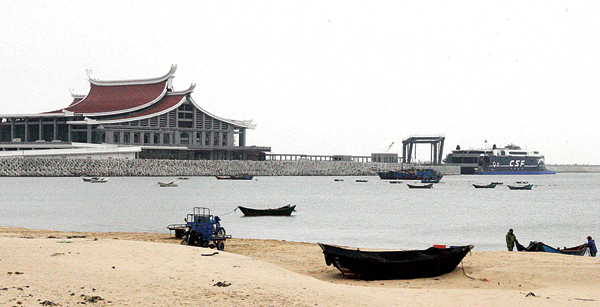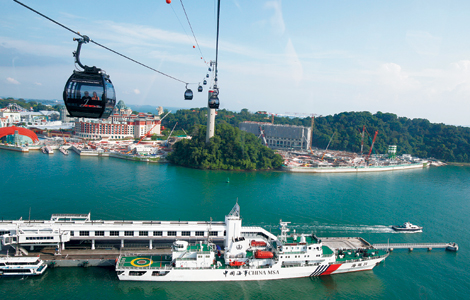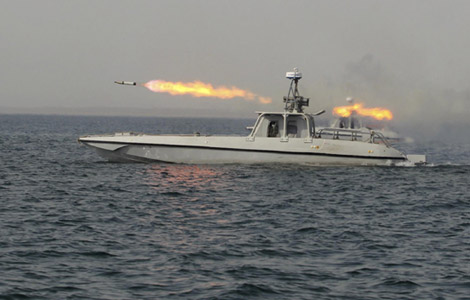Pingtan reaching across Straits
Updated: 2011-12-31 09:20
By Tan Zongyang and Hu Meidong (China Daily)
|
|||||||||
 |
|
Aoqian wharf, newly completed in Pingtan, Fujian province, receives passenger ships linking the county with Taiwan and coastal regions on Thursday. [Photo by Hu Meidong / China Daily] |
Island enacts bold plan to attract overseas industry
PINGTAN, Fujian - Pingtan county, which includes China's fifth-largest island, wants to become the next Shenzhen or Xiamen as the central government plans to grant it "more favorable" policies than those two special economic zones.
Last month, the State Council approved a general development plan for the island - now named the Pingtan comprehensive experiment zone - and called for bold moves to explore economic and political measures that take advantage of its adjacency to Taiwan.
The island in Fujian province is constructing buildings and bridges, paving highways and laying water pipes in undeveloped land, to attract more investors and immigrants from the other side of the Taiwan Straits.
Pingtan, the mainland's closest point to Taiwan, is 126 km from Hsinchu on Taiwan's west coast. A high-speed ferry went into service between Pingtan and Taichung last month, shortening the travel time across the Straits to about two and a half hours.
"We would like to attract more overseas people, especially from Taiwan, to live on the island and work with us," said Zhou Qingsong, deputy director of the administrative committee of the Pingtan comprehensive experiment zone.
Plans are in place to develop the island into a coastal urban hub. With a total investment of 100 billion yuan ($15.9 billion) by the end of next year, the island will complete a series of basic infrastructure projects to absorb industries moving in from Taiwan.
Unlike Shenzhen or Xiamen in the 1980s, which started their economic growth by developing labor-intensive industries or relied on exports, Pingtan aims to initially focus on high-tech industries at the upper end of the industry chain.
"We will not follow the old model of special economic zones, but pick and choose industries that meet our goal of building a low-carbon, environmentally friendly island," Zhou said. He added that companies that fit the island's development plan will receive more favorable tax policies.
So far, a high-tech industrial park with an investment of 7.3 billion yuan by the microelectronics manufacturer Xielli Group is under construction. Taiwan-based TPV Technology Group, a leading digital display maker, has invested in a nearby science park that has attracted more than 10 companies from Taiwan.
Under Pingtan's general development plan, the island will be driven by industries in the high-tech, shipping, logistics and marine sectors. Seaside resorts will also be built to open the long, sandy beaches to tourism.
"We are the forerunner in investing in the island because we see the opportunities," said Li Mingfu, chairman of the Xielli (Pingtan) Group Co, a joint venture with capital from the mainland, Taiwan and Hong Kong.
Li said the government provides manufacturers with favorable tax and land policies, for example trade between enterprises on the island are exempted from value-added tax and consumption tax, which helps cut taxes for companies in the whole supply chain.
The income tax rate for the companies is 15 percent, Pingtan authorities said, compared with the preferential tax rate of 24 percent in the Xiamen special economic zone.
"We can also take advantage of the mainland's low cost of labor while hiring management talent and technical experts from Taiwan," Li said. "Our employees from Taiwan can cross the Straits round trip by the ship within a day."
Xie Xiutong, an official of Pingtan, said the island is offering more than favorable economic policies. "We will first invite residents of Taiwan to Pingtan to participate in the community on the grassroots level," he said.
Over the long term, Pingtan will transform from a bonded port to a free-trade zone like Hong Kong, said Zhou.
Related Stories
First high-speed ship to Taiwan sails out of Pingtan 2011-12-01 08:14
Leader urges faster growth of Pingtan 2011-09-08 06:45
Hot Topics
Kim Jong-il, Mengniu, train crash probe, Vaclav Havel, New Year, coast guard death, Internet security, Mekong River, Strait of Hormuz, economic work conference
Editor's Picks

|

|

|

|

|

|







